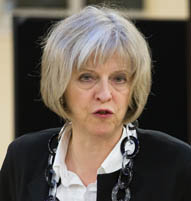Home Secretary Theresa May visited Paris on Thursday, July 2, to meet her French counterpart, Interior Minister Bernard Cazeneuve to discuss the out of control migrants in Calais seeking to reach the UK, and terrorism. They reaffirmed the determination of both countries to strengthen and complete their joint strategy to deal with these common challenges.
Richard Burnett, Chief Executive of the UK trucking trade body Road Haulage Association (RHA) said that it was totally unacceptable for truck drivers to have to run the gauntlet of fear and intimidation that is fast becoming the norm. While he welcomed the Government announcement of more resources, he added that only concerted and integrated co-operation across Europe can resolve this problem.
The RHA pointed out that clandestines seeking to enter the UK illegally were exploiting delays caused by recent strike action in the Calais area. This led to delays and HGV drivers have complained of harassment. Operation Stack on the M20 has caused hauliers further disruption. Richard Burnett added: “The resulting delays in freight vehicle movements are costing hauliers millions of pounds. For every hundred vehicles that have had no alternative but to wait, the cost will have been in excess of £30,000 per day. Although no definitive figure for the amount of vehicles stationary in Operation Stack at any one time is available, we’ve received reports from members that numbers at peak periods were over 2,500. This equates to a massive loss of £750,000 per day.
“As well as the stress and fear being experienced by the drivers, the freight companies are taking a serious financial hit. In addition to the loss of revenue due to vehicles standing, an incalculable amount of money is also being lost through missed delivery times. What was a chronic situation is now turning into an acute emergency. The issue of clandestines trying to access the UK via illegal means has been a major issue for our members and the haulage industry for years. These latest scenes at Calais dictate that we must have positive and swift action.”
In May for example the RHA complained that while static security, such as fencing, had improved at the ferry port there was no substitute for “boots on the ground” – a French issue – against clandestines attempting illegal passage to the UK who the RHA added were becoming more aggressive towards truck drivers. The UK Government said that more than 39,000 attempts to cross the Channel illegally were prevented in 2014 to 2015 – more than double the previous year.
The two ministers said after their meeting that three decisions were taken:
• The agreement reached between both countries on 20 September 2014 is being fully implemented: the joint intervention fund of 15 million euros, financed by the UK, has already allowed for the strengthening of security at the Port of Calais. Protective fencing has been installed at port access points, works are due for completion in the coming days. In light of the increased migration crisis in the Mediterranean and its repercussion on Calais, where there are 3000 migrants, the two ministers decided to further strengthen co-operation, notably by increasing the intervention fund. This will enable the installation of additional essential arrangements to prevent access to the port via the beach, but also to secure access to the Channel Tunnel, where incidents have taken place repeatedly over the past weeks. In this context, the two ministers emphasised the importance of a rapid resumption of maritime and rail traffic, which is indispensible to economic development on both sides of the Channel. Joint information campaigns to inform migrants of the reality of Great-Britain’s asylum and benefits system for migrants, to reduce the flow of migrants to Calais, will be continued and strengthened.
• France and the UK will reinforce their joint action against illegal immigration networks and the networks of people traffickers who exploit, without shame, human distress. Already, thanks to joint working, the number of networks dismantled in the Calais region in 2014 has increased by 30% compared to the previous year. This resolute action will be accompanied by a strengthening of links with transit countries, in order to support the establishment of operations to combat illegal migration and trafficking. That is the basis for ongoing work with Niger, where a migrant processing centre should be opened before the end of the year under the auspices of the International Organisation for Migration, supported by European funding. The joint intervention fund will also be used to support victims of human trafficking. The two Ministers underlined the importance of the development of policies to return illegal economic migrants, in line with the decisions taken by the European Council in June. A joint conference will take place in London in July to support better upstream management of illegal migration flows.
• Following the joint visit to Sousse (Tunisia) by French, British and German Interior Ministers on 30 June to pay respects to the victims of the terrorist attack on 26 June, the two ministers decided to increase support to Tunisia in its anti-terrorist efforts. Release of EU funds will be accelerated and security for tourists in Tunisia reinforced.









